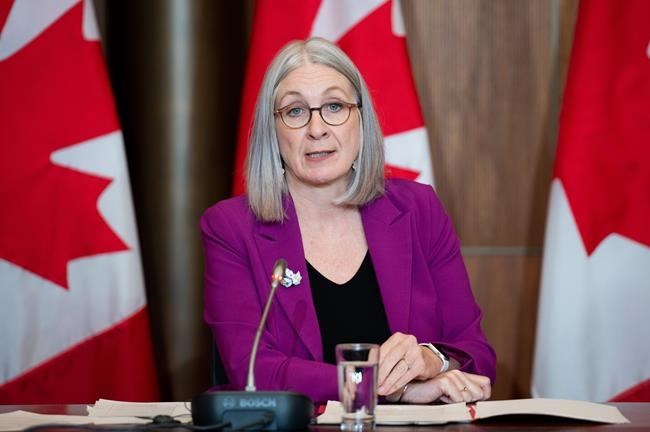OTTAWA — A multibillion-dollar settlement for children and families harmed by Ottawa's underfunding of on-reserve services is heading back to the Canadian Human Rights Tribunal for approval, as both sides seek to turn the page on a dark chapter in Canada's history.
Federal ministers and First Nations representatives presented the revised $23-billion compensation package to Canadians on Wednesday after it was endorsed the day before by delegates from the Assembly of First Nations.
"Once the Canadian Human Rights Tribunal has endorsed this agreement, it will then be taken to the Federal Court of Canada for approval in late spring or early summer of 2023," said Manitoba regional chief Cindy Woodhouse, who has led the file for the assembly.
"Once all these approvals have been granted, the claims process will begin in late 2023 or early 2024. And funds will start to flow thereafter."
The latest settlement offer comes more than 15 years after the assembly and the First Nations Child and Family Caring Society jointly launched a human-rights complaint that sparked the years-long legal battle with Ottawa.
The 2007 complaint revolved around allegations that Ottawa’s underfunding of on-reserve child welfare services amounted to discrimination, and that First Nations children were denied equal access to support ranging from school supplies and medical equipment.
The tribunal eventually ruled in the complainants' favour, setting off a range of lawsuits, appeals and proposed settlements, including one last year in which Ottawa offered to spend $20 billion to reform the child-welfare system and another $20 billion on compensation.
But the tribunal rejected that proposal over concerns that not all eligible claimants would receive compensation. The new deal includes an extra $3 billion to compensate another 13,000 people and makes other amendments both sides hope will satisfy the tribunal's concerns.
Those who qualify will receive at least $40,000, with some receiving more, as the government has agreed to pay interest on the payments.
Indigenous Services Minister Patty Hajdu said during a news conference with Woodhouse and others that the latest compensation package represents the largest settlement offer in Canadian history.
"The revised agreement, as I said, isn't going to make people whole," she added. "No amount of money can make people whole. But it is an important piece of healing because it's an acknowledgment of the discrimination."
Hajdu drew a direct link between Ottawa's failure to provide proper funding for child-welfare services in First Nations communities and the discovery of 33-year-old Linda Mary Beardy's body in a Winnipeg landfill on Monday.
"There's no coincidence that Indigenous people face higher rates of violence, Indigenous women and girls face higher rates of violence, and it's connected to what we're here to talk about today: compensation for a discriminatory system," she said.
"That meant that children didn't get a fair chance. They didn't get a fair start. And they were in many cases ripped away from families, from moms and dads and aunties and community and language and culture and connection."
Ashley Bach, who was taken from her family and First Nations community in northwestern Ontario shortly after birth, described the proposed settlement as "a step towards enabling our healing of the harms that we've experienced and suffered."
"I'm hoping that this compensation will be one way that we (will) be able to return home, be able to learn our languages, even go to school and use to raise our families," she said.
Yet even as Woodhouse and Bach welcomed the revised deal, they echoed calls from the Assembly of First Nations for Prime Minister Justin Trudeau to issue a formal apology as part of the final settlement.
Neither Hajdu nor Marc Miller, the minister for Crown-Indigenous relations, addressed such calls during Wednesday's news conference.
Trudeau's office said in a statement that the settlement agreement "marks an important milestone" in terms of providing accountability to First Nations families and children.
"This agreement has been First Nations-led and designed every step of the way, and we thank all the parties involved for ensuring we get this right," it said.
This report by The Canadian Press was first published April 5, 2023.
— With files from Stephanie Taylor.
Lee Berthiaume, The Canadian Press



